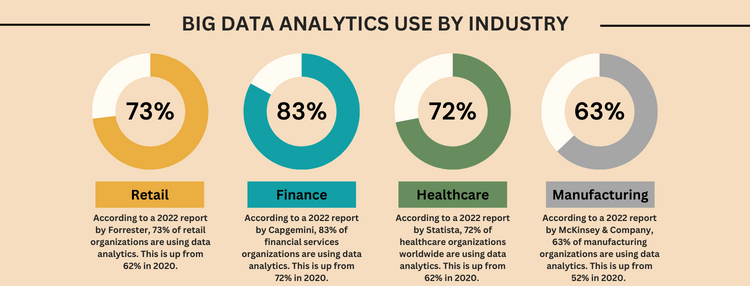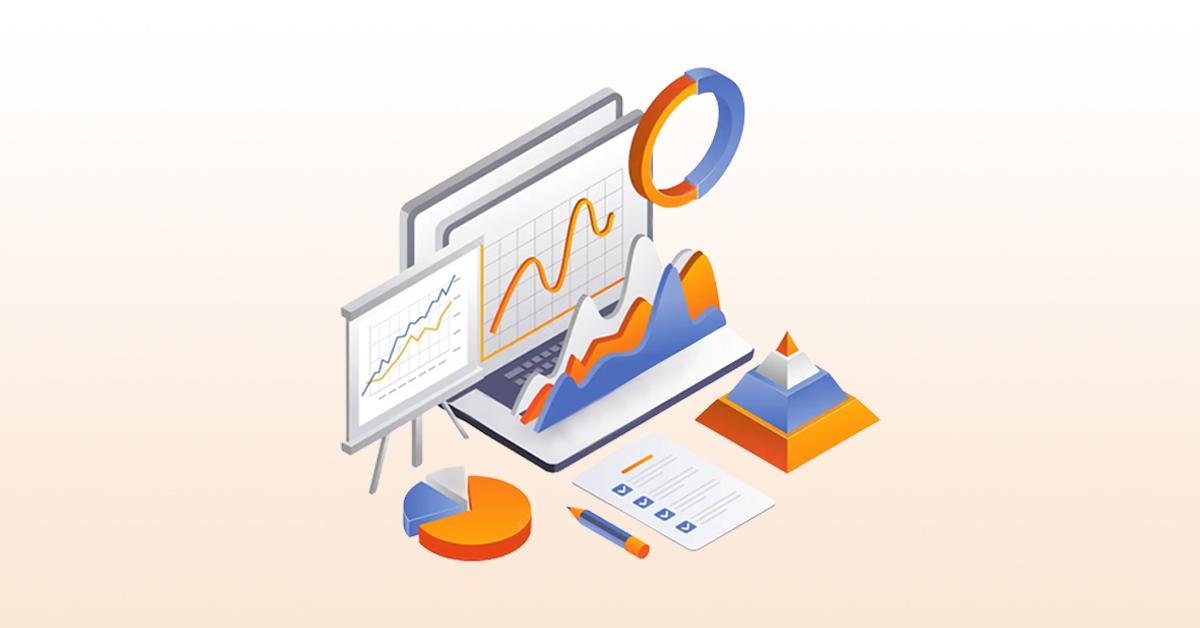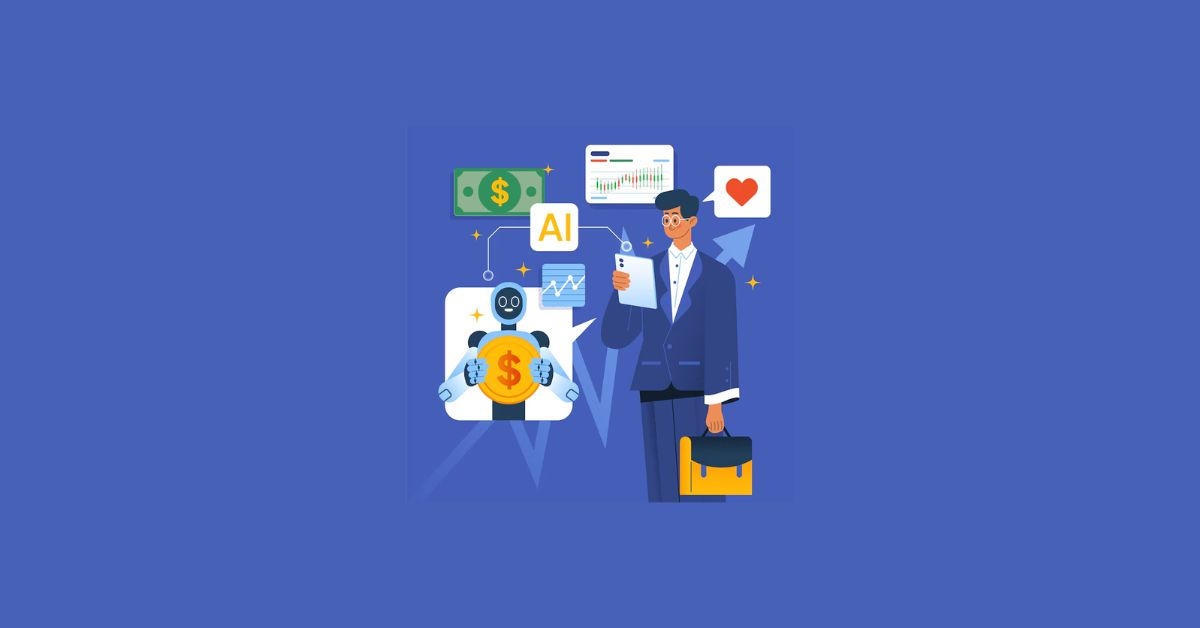Data analytics solutions have become increasingly important for businesses of all sizes and industries. With the right data analytics services, businesses can leverage their data to gain valuable insights, optimize operations, and make better decisions. In this blog, we will discuss the most common types of data analytics services and the benefits of using big data analytics in business.
Data analytics solutions have become increasingly important for businesses of all sizes and industries. With the right data analytics services, businesses can leverage their data to gain valuable insights, optimize operations, and make better decisions. In this blog, we will discuss the most common types of data analytics services and the benefits of using big data analytics in business.
Most Common Different Types of Big Data Analytics Services
Businesses use a variety of data analytics services to analyze their data and gain insights into their operations. The three most common types of data analytics services are business intelligence, data mining, and machine learning.
- Business intelligence: Business intelligence (BI) is a broad term that encompasses a variety of data analytics tools and techniques that can be used to gain insights into business performance. BI tools can be used to track sales, inventory, customer behavior, and other key metrics.
- Data mining: Data mining is a more specialized type of data analytics that focuses on finding hidden patterns and trends in data. Data mining can be used to identify customer segments, predict customer behavior, and optimize marketing campaigns.
- Machine learning: Machine learning is a type of artificial intelligence (AI) that allows computers to learn without being explicitly programmed. Machine learning can be used to automate tasks, make predictions, and improve decision-making.
If you’re unsure what type of data analytics solutions are right for your business, GrapesTech Solutions is a leading data analytics company. they can help you collect, clean, and analyze your data, and they can provide you with the tools and expertise you need to make informed decisions.

You might want to read
The Use Cases of Big Data Analytics Services in Business
In today’s data-driven world, big data analytics is more important than ever for businesses of all sizes. By collecting, storing, and analyzing large amounts of data, businesses can gain insights into their customers, optimize their operations, make better decisions, spot risks and threats, and innovate new products and services.
Here are five use cases of big data analytics to achieve these goals:
1. Improve Customer Insights
Data analytics can help businesses gain a better understanding of their customers’ needs, preferences, and behavior. By analyzing customer data, businesses can create personalized marketing strategies, improve customer experience, and develop new products and services that meet the needs of their target audience.
Example- A retail store could use big data analytics to track customer behavior in-store and online. This information could then be used to personalize the shopping experience for each customer, recommend products that they are likely to be interested in, and prevent fraud.
2. Optimize Operations
Big data analytics can be used to identify inefficiencies in business operations and make them more efficient. This can lead to cost savings, improved productivity, and better customer service.
Example- A manufacturing company could use big data analytics to track the performance of its machines. This information could then be used to identify and fix problems before they cause production delays or quality issues.
3. Make Better Decisions
The utilization of data analytics can greatly benefit businesses in making informed decisions by providing them with precise and up-to-date information. With the ability to analyze data in real-time, businesses can quickly detect emerging patterns and trends and take prompt actions. This is especially crucial in industries such as finance and e-commerce, where time plays a vital role in achieving success.
Example- A financial services company could use big data analytics to predict which customers are most likely to default on their loans. This information could then be used to deny loans to high-risk customers, which would reduce the company’s losses.
4. Spot Risks and Threats
Data analytics can help businesses identify potential risks and threats before they cause significant financial damage. By analyzing data in real-time, businesses can detect fraudulent activities and take immediate action to prevent financial losses. Data analytics can also be used for predictive maintenance, which involves analyzing data from various sensors to predict when equipment is likely to fail.
Example- A healthcare company could use big data analytics to track the spread of diseases. This information could then be used to develop early warning systems and prevent outbreaks.
5. Innovate New Products and Services
Using Data analytics can help businesses identify new business opportunities. By analyzing data from various sources, businesses can identify gaps in the market and develop new products or services to fill them. This can help businesses diversify their offerings and reduce their reliance on a single product or service.
Example- A telecommunications company could use big data analytics to track customer usage patterns. This information could then be used to develop new products and services that meet the needs of its customers.
These are just a few of the many ways that big data analytics can be used to make businesses smarter. As the amount of data that businesses collect continues to grow, the potential benefits of big data analytics will only increase.
Want to Know How Our Data Analytics Company Can Help Your Business?
If you’re not already using big data analytics, now is the time to start. Big data can help you improve your business in a number of ways, and it’s only going to become more important in the future.
Tips for Getting Started with Data Analytics
If you are considering using big data analytics in your business, here are five tips to help you get started:
1. Identify Your Goals
Before you start collecting and analyzing data, it’s important to identify your goals. What do you want to achieve with data analytics? Are you looking to improve customer experience, optimize operations, or develop new products and services? Knowing your goals will help you focus your efforts and achieve better results.
2. Collect the Right Data
To get meaningful insights from data analytics, you need to collect the right data. This involves identifying the key metrics that are relevant to your business goals and collecting data from various sources.
3. Clean Your Data
Data cleaning is an important step in the data analytics process. Before you can analyze your data, you need to ensure that it is accurate, complete, and consistent. This involves identifying and correcting errors, removing duplicates, and dealing with missing data
4. Analyze Your Data
Once you have collected and cleaned your data, it’s time to analyze it. There are a variety of data analytics tools and techniques that you can use to analyze your data, including regression analysis, clustering, and predictive modeling. The choice of technique will depend on your business goals and the nature of your data.
5. Take Action
The final step in the data analytics process is to take action based on your insights. This could involve implementing new processes, developing new products or services, or changing your marketing strategy. It’s important to monitor the impact of your actions and make adjustments as needed.
Examples of Big Data Analytics Being Used in Different Industries Today
Retail
Retailers use data analytics to gain insights into customer behavior, preferences, and buying patterns. By analyzing data from loyalty programs, social media, and online sales, retailers can develop personalized marketing campaigns and improve customer experience.
Financial Services
Financial services companies use data analytics to detect fraudulent activities, manage risk, and improve customer experience. By analyzing data from various sources, including transaction records, social media, and credit reports, financial services companies can identify potential risks and opportunities and take appropriate action.
Healthcare
Healthcare providers use data analytics to improve patient outcomes, reduce costs, and optimize operations. By analyzing patient data, healthcare providers can identify patterns and trends that can help them develop personalized treatment plans and improve patient care.
Manufacturing
Manufacturers use data analytics to optimize their supply chain, improve production efficiency, and reduce costs. By analyzing data from sensors, machines, and other sources, manufacturers can detect potential issues and take corrective action before they cause significant downtime or production delays.
These are just a few examples of big data analytics being used in business today. As the amount of data that businesses collect continues to grow, the potential benefits of big data analytics will only increase.

Conclusion
Data analytics is a powerful tool that can help businesses of all sizes and industries gain valuable insights into their operations, customers, and markets. By using big data analytics services, businesses can improve customer experience, optimize operations, make better decisions, and innovate new products and services. To get started with data analytics, it’s important to identify your goals, collect the right data, clean your data, analyze your data, and take action based on your insights. By following these tips and best practices, businesses can leverage their data to achieve their goals and stay ahead of the competition.
I hope this blog post has given you a better understanding of how big data analytics can be used to make your business smarter. If you have any questions, please feel free to leave a comment below.
Frequently Asked Questions
Big data analytics involves analyzing large sets of data to extract valuable insights and make informed decisions.
Big data analytics can help businesses improve customer insights, optimize operations, make better decisions, spot risks and threats, and innovate new products and services.
The most common types of data analytics services are business intelligence, data mining, and machine learning.
To get started with data analytics, you should identify your goals, collect the right data, clean your data, choose the right tools, and hire the right talent.
The challenges of big data analytics include managing large volumes of data, ensuring data quality, protecting data privacy, and finding the right talent to perform data analysis.















